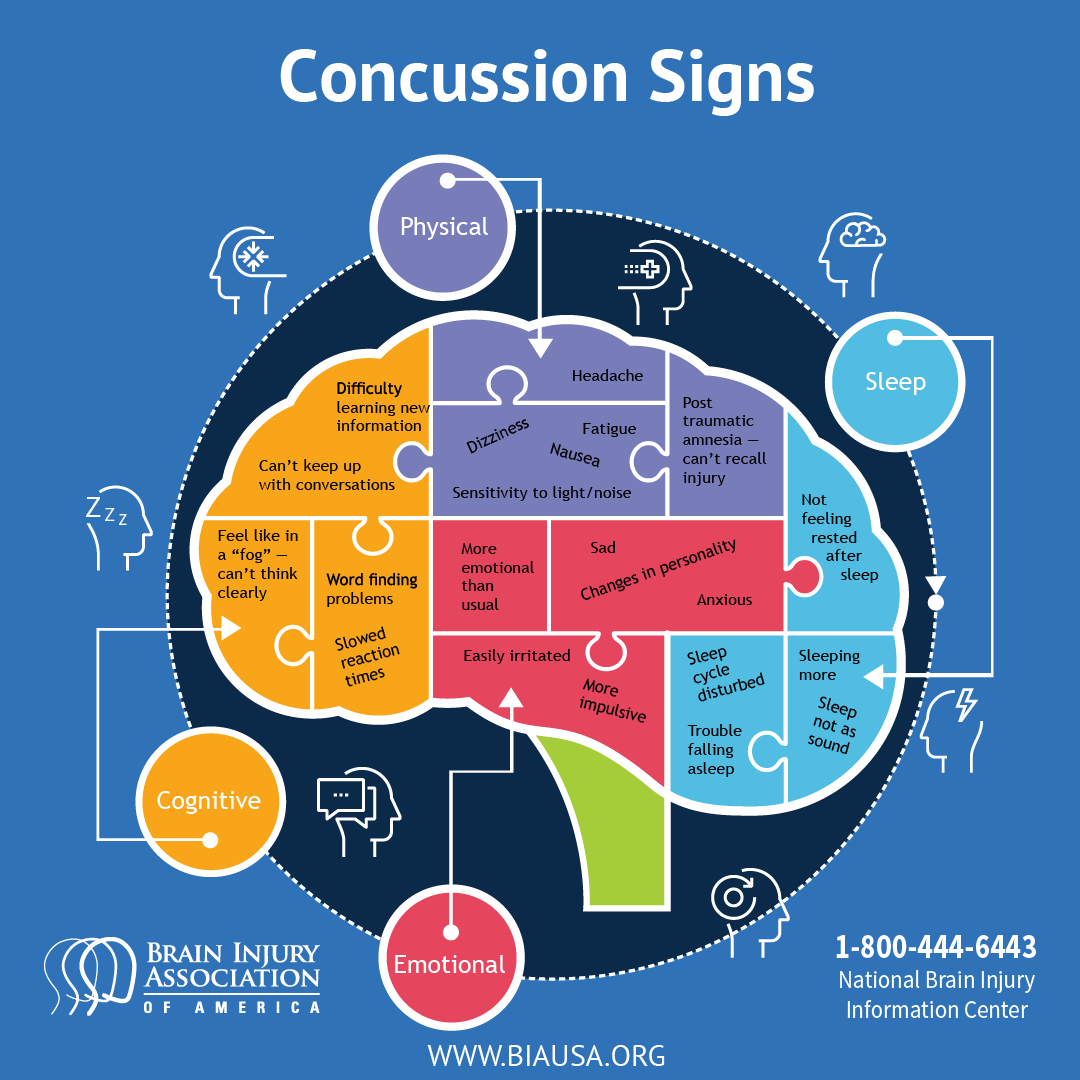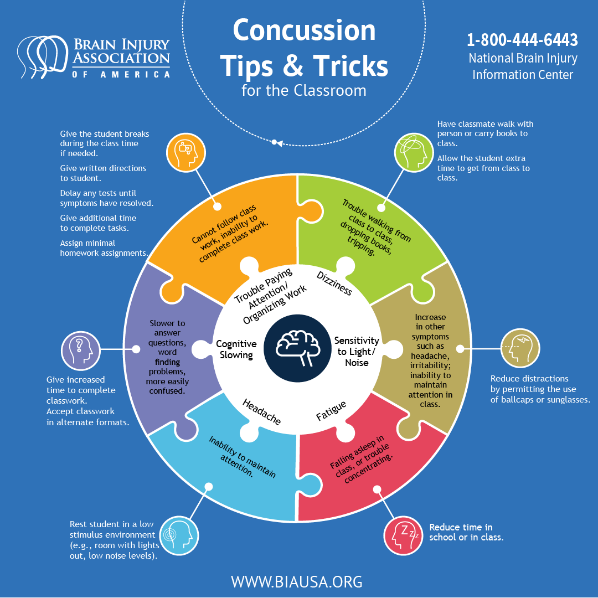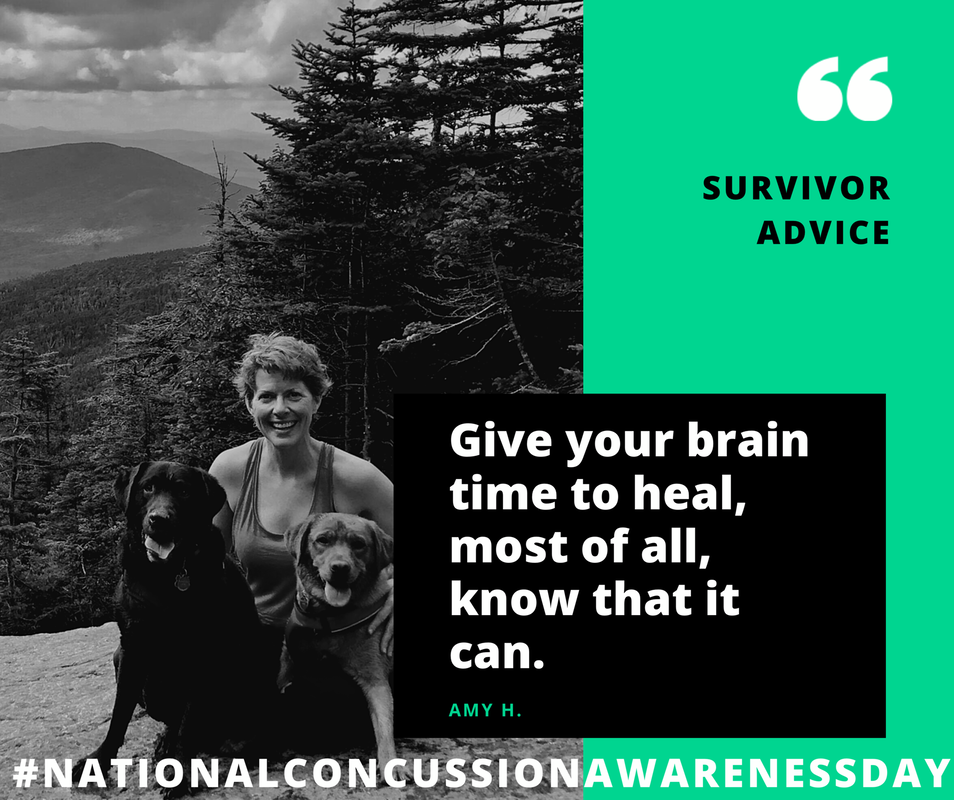Student Accessibility Services (SAS) Acknowledges National Concussion Awareness Day, Friday, September 18th, 2020
General Information about Concussions
 Signs and Symptoms of Concussions
Signs and Symptoms of Concussions
According to the Center for Disease Control (CDC), a concussion is a type of traumatic brain injury—or TBI—caused by a bump, blow, or jolt to the head or by a hit to the body that causes the head and brain to move rapidly back and forth. This sudden movement can cause the brain to bounce around or twist in the skull, creating chemical changes in the brain and sometimes stretching and damaging brain cells.
Typical Signs of a Concussion are:
- Headache
- Nausea/Vomiting
- Tinnitus (Ringing in Ears)
- Blurred Vision
- Sensitivity to Light/Noise
- Dizziness/Balance Issues
- Irritability
- Depression
- Anxiety
- Impulsivity
- Lack of Initiation/Drive
- Impaired Awareness
- Feeling “In a Fog”
- Attention Problems
- Trouble Remembering
- Trouble Finding Words
- Difficulty Filtering Noise& Keeping Up With Conversations
- Drowsiness
- Excessive Sleep
- Difficulty Falling Asleep
- Altered Sleep Patterns
- Awaking from Sleep
- Feeling Drained vs. Refreshed
National Concussion Awareness Day at UMaine:
In an effort to raise awareness about concussions amongst the UMaine community, Student Accessibility Services (SAS) has created a podcast titled “Concussion Awareness”. The podcast is moderated by Mandi Gearhart, Administrative Specialist in SAS. The podcast includes two guest speakers, Mary, a student who shares their personal experiences with concussions and Brianna Woodworth, MS, ATC, EMTB a wellness educator at Culter Health that specializes in concussion recovery. The podcast includes suggestions on how to recuperate from a concussion, as well as available resources at UMaine.
To listen to the Podcast click on Soundcloud here: Concussion Awareness
DownloadPodcast 8 – Concussion transcript
For more podcasts about Concussions, check out CDC Head’s Up website with videos, podcasts and other resources about concussions.
If you have suffered a concussion, share your story on social media Friday, September 18th and use #NationalConcussionAwarenessDay to tag it.
Recovery and resources
 Tips to Aid Recovery According to the Brian Injury Association of America:
Tips to Aid Recovery According to the Brian Injury Association of America:
- If you suspect a brain injury, go to a physician or E.R. immediately for an exam
- Get plenty of rest; do not rush back to work or school
- Avoid doing anything that could lead to another blow or jolt to the head
- Ask your doctor when it will be safe to drive a car, ride a bike, or use heavy equipment because your ability to react may be slower after a brain injury
- Take only the medications your doctor has approved Speak to your doctor before consuming alcohol
- Write things down if you have trouble with memory
Resources available for UMaine Students who have Concussions:
- Northern Light Cutler Health Center, 207.581.4000
- Student Accessibility Services, 207.581.2319
National Resources:
- Center for Disease Control (CDC) Headsup
- National Brian Injury Association of America
- National Brian Injury Information Center (NBIIC) at 1.800.444.6443
Why is it so Important to Raise Awareness about Concussions?
According to data from the CDC:
- In 2014,1 about 2.87 million traumatic brain injury (TBI) related emergency department (ED) visits, hospitalizations, and deaths occurred in the United States, including over 837,000 of these health events among children. TBI contributed to the deaths of 56,800 people, including 2,529 deaths among children.
- TBI was diagnosed in approximately 288,000 hospitalizations, including over 23,000 among children. These consisted of TBI alone or TBI in combination with other injuries.
- In 2014, an estimated 812,000 children (age 17 or younger) were treated in U.S. EDs for concussion or TBI, alone or in combination with other injuries.1
- Over the span of eight years (2006–2014), while age-adjusted rates of TBI-related ED visits increased by 54%, hospitalization rates decreased by 8% and death rates decreased by 6%.1
For more information about data and statistics, please click here.

